I’ve been told that I have the kind of face that could be from anywhere. And it’s meant as a compliment. When travelling in Morocco I could be Moroccan, in Tanzania I could be East African, in the Arab world I could be Arab and in India I could be Indian. It’s a joyful experience to be able to blend in. Although it can lead to some humorous, wry and occasionally awkward situations where I’m spoken to rapidly in a local language that I don’t understand, and then berated for looking completely blank.
The irony is that Britain – where I was born, where I live, contribute, pay taxes, work and raise my family, in the place of my home and where I hold citizenship – is the place I’m most often asked: “Where are you from?”
“London” is my usual answer, and an accurate one. And my interlocutor could leave it at that and move on to the next topic. It’s the follow-up question that’s the problem. “No, where are you really from?” What’s the answer to that one? “Erm, north London?”
These same questions made headline news in the UK this month when a royal aide at Buckingham Palace started posed them relentlessly to one of the guests.
The excruciating conversation – which resonated in the fibres of most likely every person of minority ethnic background in the UK – was directed with seemingly ferocious intent by Lady Susan Hussey to prove that the guest, Ngozi Fulani, was not “really" from Britain.
The questions included “Where are you from?”, “No, where do you come from?”, “No, what part of Africa are you from?”, “No, but what nationality are you?” and “No, but where do your people come from?”. Finally, this led to the remark “Oh I can see I am going to have a challenge getting you to say where you’re from,” and the conversation still continued in this vein.
That’s aside from the fact that Lady Hussey felt it was perfectly okay for her to move her guest’s hair – a stranger to her – without asking permission.
The irony of all this is that Ms Fulani was at an event about tackling violence against women and girls. She was there in her capacity as chief executive of Sistah Space, a charity that offers specialist support for women of African and Caribbean heritage affected by abuse. So there was lots to talk about, the least interesting of which was where she is really from.
Some people have argued this line of questioning is legitimate and shows an interest. But what the repeated attempts show in the doubling down on the questions – despite resistance from the person being asked (some might say interrogated) – is a total disregard of who the person is, her story, her boundaries of not wanting to pursue a conversation line further and her self-definition on her own terms. Lady Hussey was literally telling her what an acceptable definition would be.
I am someone who is relentlessly curious about people's stories, so in a benevolent reading of the situation – benevolent to the wealthy, privileged royal aide who happens to be a white woman, but malicious in its interpretation of a black woman doing community work – I can understand how this question can be perceived as one of curiosity and innocence. But we must have our eyes open about the power imbalances in asking it, who is the asker and who is the asked, and the context and narrative that other people (always the “asked”) provide to the situation and what the subtext is.
What we also see at play here is the “paradox of ethnicity”. That ethnicity is important to people, but it shouldn't be the only thing that we talk about. But in this conversation the only thing that was of interest was Fulani's ethnicity.
But when ethnicity is a deeper, more nuanced collection of attributes that make up their sense of self and place in the world and how they interact with it, people can be keen to say that it is central to who they are.
Breaking the paradox of ethnicity is about breaking the reduction of people to merely the external superficial markers - primarily how people look, and where their ancestors hail from. Neither of which really focus on who the person is. Actually identity – for all of us, irrespective of ethnicity – is a complex thing of many factors, including nationally, community, religion and even regionality.
Too often, ethnicity can be dealt with as a very reductive reference point, leaving people feeling judged superficially and limited to nothing more than their ethnicity. In fact, if they are reduced to nothing more than their ethnicity, this reinforces the stereotyping, homogenisation and racism they already endure.
While the conversation was excruciating, it was absolutely critical to have in the UK right now as we grapple with who we are. What the incident prompts us to think about is how do we have conversations about ethnicity that are not from the 1920s, when Britain was at the height of its powers and from which emerged the likes of the conversations spotlighted by Lady Hussey. It’s time to relegate “where are you really from” to the consigns of history. Rather, it’s time for new conversations that focus on the stories of who people are, not reducing them to the colour of their skin.


